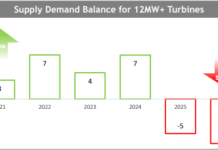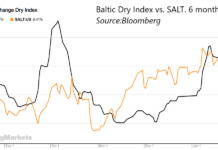Bribing and Pressuring Fissile Regimes
On July 25th, France offered to build a nuclear reactor for Libya to power a water desalinization plant. Russia is delaying the delivery of nuclear fuel for Iran’s nearly completed Bushehr to help pressure them to comply with UN Security council demands for less secrecy. South Korea, Japan, China, Russia, and the United States promised to provide 950 thousand tons of oil or equivalent aid to North Korea in return for permanently disabling all its nuclear facilities.
I’m not going to argue about whether using energy aid is the best way to influence this country or that; the fact is that no matter what you or I think about it, the carrot will always be part of international diplomacy, as well the stick. I want to talk about what form that carrot takes.
This map shows the amount of solar energy in hours, received each day on an optimally tilted surface during the worst month of the year.
Image Source: Sunwize.
Both Iran and Libya are well suited for concentrating solar power (CSP), and the declared purpose of the reactor for Libya is desalinization, an excellent application for CSP. Iran has a wind resource as good as the American Midwest (although CSP may be a better choice due to sandstorms.) While North Korea has only moderate insolation, US non-governmental organizations were already working to help North Koreans with wind power in 1999. North Korea has a high quality wind resource all along its Western coastline in Korea Bay, which is shallow and well suited to offshore wind, and also nearest the capital, Pyongyang.
Intermittent Electricity would be an Improvement
The strongest objection to wind power (and to a much lesser extent solar) is that these are intermittent resources. Yet all these countries already have problems with persistent power outages. Iran already has problems meeting demand during peak summer hours, and CSP is better suited for meeting peak summer loads than nuclear power, which is a baseload resource, which operates at its worst on hot summer days due to its cooling requirements.

Power utility time of use for California CSP Plants. Source: San Diego Renewable Energy Study Group, 2005 [.pdf, page 15.]
In Libya and North Korea, the electricity situation is even worse. Libya’s utility vows to reduce power rationing, and provide more hours of electricity, while in North Korea the entire nation, with the exception of Pyongyang, is switched off at night. Providing North Korea with intermittent wind power rather than fuel oil for dispatchable power plants might lessen Kim Il Sung’s incentive to give his capital such favorable treatment compared to the countryside, and do more to help the populace, rather than giving the regime another lever for control.
Technologies for Peaceful Applications
Iran and Libya claim that they want nuclear power only for peaceful applications. Concentrating solar power is better suited to enhance their energy security than nuclear because it does not rely on imported uranium. If that is what they want, CSP seems just as well suited for their purposes, and would give them greater energy security since it does not rely on imported fuel. With North Korea, supplying wind turbines would be even simpler politically, because the existing agreement already allows for equivalent energy aid. If we in the West are worried about the additional security renewable energy might give to these unpredictable regimes, shouldn’t we be even more worried about providing them with nuclear material?
This same line of thought applies to President Bush’s possibly Nuclear Non-Proliferation Treaty-busting deal with India. Regions of Southern and Western India also have excellent solar resources (see map). India may already have the bomb, but that is no excuse for eviscerating one of the few (and already weak) safeguards the world has against nuclear proliferation. It might be argued that India does not need our help to take advantage of their renewable energy resources, but, if so, why do they need our help with their civilian nuclear industry?









Tom, you had to get a rise out of me again. As the chief in Shrub had said when he was visiting the Raj, ‘Americans, hehe, are looking forward, hehe, to enjoying Indian mangoes.’ To which PM Singh answered in his head that ‘Indians are looking forward to enjoying Westinghouse AP1000 reactor plants.’ We elected a real sharpie this time, the brightest star on the tree.
Uranium, like oil and coal and nat gas, are all depleting resources. u308 spiked to $130 this spring. If that is not a foreshadowing of a crunch, then what is? The nukesters never seem to entertain this possibility but would rather get us into dependency on another finite resource. Somehow thorium (THPW), more plentiful and which does not lend itself to being weaponized is also left out of the discussion. The Russians are probably farther along with thorium reactors, having run a successful scale model this spring, than anyone. So why are they not hawking that to Iran.
the article is highly misleading in clubbing India with countries like Libya and North Korea. Its not India who needs the NSG but rather the opposite case , companies like GE and Toshiba salivating at the prospects of the >$100bb nuclear energy market of India.To put India in the same bracket as blackmailing North Korea is plain nonsense and reflects the lack of knowledge of foreign affairs.
My intent is not to “club” India with N Korea and Libya in terms of their politics. The only similarity I am trying to draw is that Bush is trying to get better relations with India in exchange for nuclear help.
Western companies could make just as much money providing concentrating solar power to India as they could providing nuclear (although it would be different companies.) The fact is that providing nuclear help to India makes a mockery of the NPT, and there are other options.
The increased security risks from providing nuclear help to India do not come directly from India itself, but from other regimes who will now have less incentive to abide by the terms of the NPT.
Read the article that I linked to about the NPT.